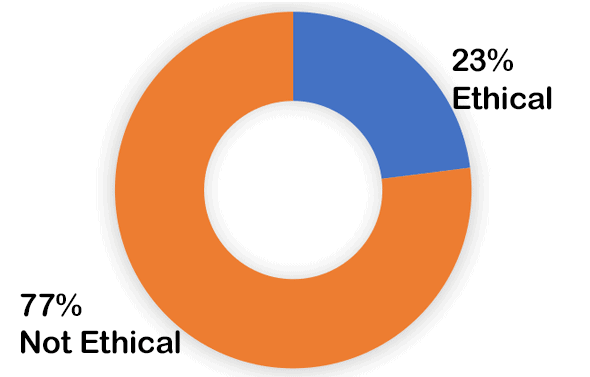This is the November 2020 edition of our monthly series of Ethics case studies titled What Do You Think? This series is comprised of case studies from NSPE archives, involving both real and hypothetical matters submitted by engineers, public officials and members of the public.
Your peers and the NSPE Board of Ethical Review have reviewed the facts of the case as shown below. And, here are the results.
Your opinion has been registered for the November 2020 edition of our monthly series of Ethics case studies titled What Do You Think?
Your vote is recorded as:

Want to know how your peers voted? We’ll send you an email with the poll results on November 24.
Your opinion has been registered for the November 2020 edition of our monthly series of Ethics case studies titled What Do You Think?
Your vote is recorded as:

Want to know how your peers voted? We’ll send you an email with the poll results on November 24.
A Review of the Facts
Engineer Robert, a forensic engineer, accepts a retainer from a plaintiff’s attorney who sends him selected file documentation. Robert subsequently bills the attorney for the work, which includes a review of the case documentation. Because of an undisclosed disagreement between Robert and the attorney, Robert ceases performing work without delivering a report to the attorney or receiving additional payment for services. Thereafter, Robert returns the retainer to attorney and all of the file documentation that the attorney had earlier provided to Robert. Several months later, Robert is approached by the defense attorneys in the same case, and Robert accepts the assignment to function as one of the experts for the defense.
Given these facts, was it ethical for Robert to accept the assignment to function as one of the experts for the defenses?
Here is the result of our survey of your peers:

Applicable NSPE Code References:
Code II.4.a: Engineers shall disclose all known or potential conflicts of interest that could influence or appear to influence their judgment or the quality of their services.
Code III.4: Engineers shall not disclose, without consent, confidential information concerning the business affairs or technical processes of any present or former client or employer, or public body on which they serve.
Code III.4.a: Engineers shall not, without the consent of all interested parties, promote or arrange for new employment or practice in connection with a specific project for which the engineer has gained particular and specialized knowledge.
Discussion
One of the most common ethical issues that engineers face in their professional lives is conflict of interest. At one point in time, engineering codes of ethics, including the NSPE Code of Ethics for Engineers, specifically implored engineers to avoid all conflicts of interest. The basis for this position was that the engineer cannot serve two masters and when faced with a conflict of interest, the engineer must in all cases take steps to remove themselves from such conflicts. Among the concerns expressed by supporters of this position was that engineers who were involved in conflict of interest situations created a poor image for the engineering profession because the issue raised the appearance of impropriety.
However, over time, the engineering profession concluded that conflicts of interests were an immutable fact of professional engineering practice and that it was virtually impossible for the engineer to, in all cases, remove themselves from such situations. As a result, Codes were changed and engineers were implored to disclose all known or potential conflicts of interest to their employers or clients, by promptly informing them of any business association, interest or other circumstance which could influence or appear to influence their judgment or the quality of their services. Hand in hand with the issue of conflicts of interest is the obligation of the engineer to not disclose confidential information or represent adversarial interests concerning the business affairs or a particular proceeding involving any present or former client without his or her consent. (See NSPE Code II.4.a., Code III.4, Code III.4.a.).
Turning to the facts in the case, we conclude that it would unethical for Robert to accept the assignment in question without the consent of all concerned—consent that will almost surely be withheld. Even though Robert has returned the retainer fee and the files back to the plaintiff’s attorney who had originally retained him, Robert had already reviewed the sensitive material relating to the plaintiff’s case and therefore has an obligation to protect the interest of the original client—the plaintiff. It would not be possible for Robert to purge himself of the knowledge of the information he initially received from the plaintiff, and therefore he would be damaging the interests of his former client by working on behalf of the defendant.
While there is nothing improper with returning the full retainer fee under the facts, it would be equitable for an engineer to retain a portion of the retainer to cover expenses incurred up to the point of termination of the relationship.
The Ethical Review Board’s Conclusion

It was unethical for Robert to accept the assignment to function as one of the experts for the defense under the facts.
BOARD OF ETHICAL REVIEW
James G. Fuller, P.E., William W. Middleton, P.E., Robert L. Nichols, P.E., William E. Norris, P.E., Paul E. Pritzker, P.E., Jimmy H. Smith, P.E., C. Allen Wortley, P.E. (Observer), Donald L. Hiatte, P.E., Chairman
Note – In regard to the question of application of the Code to corporations vis-a-vis real persons, business form or type should not negate nor influence conformance of individuals to the Code. The Code deals with professional services, which services must be performed by real persons. Real persons in turn establish and implement policies within business structures. The Code is clearly written to apply to the Engineer and it is incumbent on a member of NSPE to endeavor to live up to its provisions. This applies to all pertinent sections of the Code. This opinion is based on data submitted to the Board of Ethical Review and does not necessarily represent all of the pertinent facts when applied to a specific case. This opinion is for educational purposes only and should not be construed as expressing any opinion on the ethics of specific individuals. This opinion may be reprinted without further permission, provided that this statement is included before or after the text of the case.








Thanks, excellent example. Since it is impossible to know how little or how much Robert already knew about the case, his opinion will never be completely accepted as impartial.
I am not familiar with court proceedings, but based on the description of “selected file documentation” my assumption was that this information would have been submitted to the court and would be available for review by the defendant’s attorney, and therefore not “sensitive material” and not leading to a conflict of interest. Otherwise, the Review of the Facts should have stated that the file documentation provided to the engineer by the plaintiff’s attorney would not have been available to the defendant’s attorney for review.
If Robert were to disclose the prior engagement and receive a release from plaintiff’s counsel, then this would move to a more ethical situation. As noted in the discussion, the sensitive materials consumed is the conflict.
If the plaintiff counsel were to release Robert, knowing what Robert had access to, then this would clear it up.
These items could be public records and/or with the defence under discovery, but only the plaintiff’s counsel can waive the conflict.
After taking a retainer fee, reviewing material and surely having discussions with the retaining attorney, the engineer possessed information that the plaintiff’s attorney would not want to disclose to a defendant. At best, this would lead to having at least one motion before the court to preclude his testimony, and potentially, he would be barred from testifying at trial or have to face some difficult cross examination at trial that detracts from the real issues of the case. The expert should have kept payment for his work and returned any excess money, and declined any other offers to participate in this matter.
I agree.
In this particular case simply informing the defense attorney of the fact thate he, Robert, had reviewed some of plantiff’s files is insufficient. He should have disclosed the facts to the defense attorney and ask the defense attorney to contact the plaintiff’s attorney for his approval or disapproval of Robert serving the defense.
interesting finding by the experts… First off, the engineer should of course advise the defense and the plaintiff that he has, essentially, switched sides, and probably explain to the plaintiff why. Second, I believe that any of the files that the plaintiff had provided should be discoverable in any case, and would not be withheld from the defense. Third, whatever information that might be important to the case should be disclosed as part of the engineer’s obligation to the public good.
Thoughts?
Thanks
Thanks and I agree. There is conflict of interest. The engineer knows a lot on the plaintiff’s side and accepts the job on the other side.